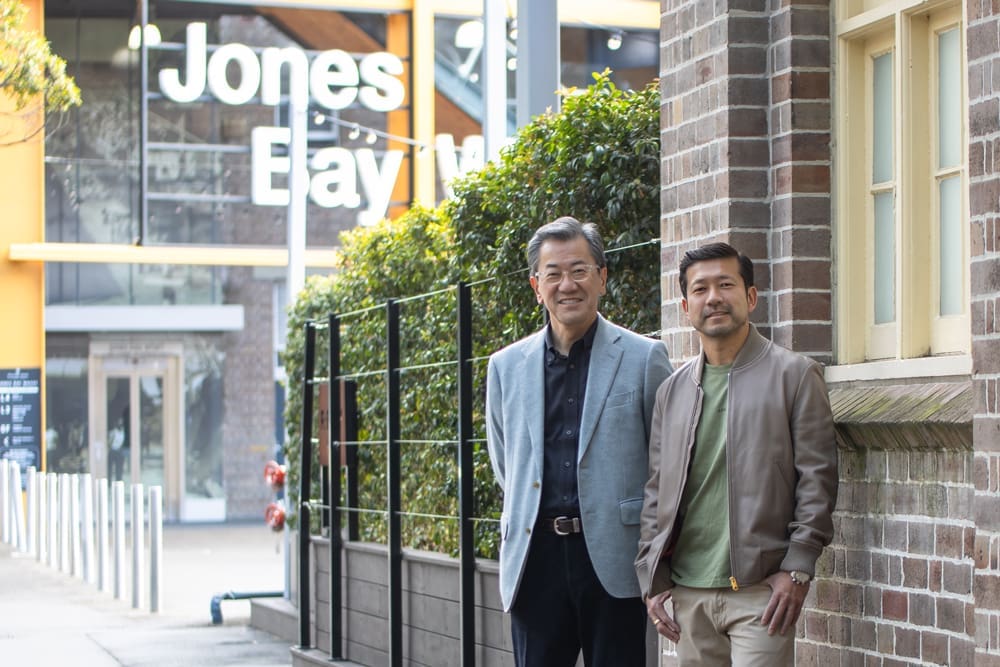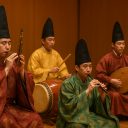
Shingo Yamagami, currently an active diplomatic commentator across various media outlets and former Japanese diplomat who served as Japan’s Ambassador to Australia (2020–2023), visited Sydney in August. Yoshinori Sakuno, founder and Group Managing Director of doq®, one of the most dynamic and high-profile Japanese companies in Australia, spoke with Mr. Yamagami, an old acquaintance, about the appeal of Australia and issues facing Japanese diplomacy.
(Photo: Satoko Clark, Translated from Japanese by Sachi Kobayashi)
Sakuno: What was the most memorable experience for you, Mr. Yamagami, during your time as the former Ambassador of Japan to Australia?
Yamagami: Throughout regional Australia, I felt the legacy of a strong Japanese presence. Witnessing this first-hand left a lasting impression on me. In Japan, information about Australia is scarce. Despite our strong ties, the only major Japanese newspaper with a bureau in Sydney is the Nihon Keizei Shimbun (Nikkei), so little information about Australia reaches Japanese households. However, once I started living here, I saw firsthand the many historical connections between our countries, such as the Japanese pearl divers of Thursday Island, the midget submarines in Sydney Harbor, and the Cowra breakout. More recently, it’s evident that Australia’s development in areas like coal in New South Wales, iron ore in Western Australia, and gas in the Northern Territory, has only been realised to this extent through cooperation with Japan.I was struck by how deeply Japanese experiences have been interwoven into the fabric of the country.
Sakuno: When comparing the Japanese communities in the United States and Australia, both of which are multicultural nations, what differences do you notice?
Yamagami: The key difference lies in Australia’s history of the White Australia policy, which, for a time, prohibited Japanese immigration. Unlike in the U.S., where the Japanese-American community has long been established, there was previously very little Japanese presence in Australia. While Japanese-Americans have had a significant impact in representing Japanese voices and perspectives, in more recent years the active presence of Japanese residents in Australia have been gradually bridging the divide. With around 100,000 Japanese residents, close to the number of Japanese residents in China, Australia is very valuable to Japan. In return, I believe that Japanese people have the potential to help Australia evolve. In speeches to Australians, I have always emphasised that their country is blessed with three wonderful things that exist in harmony: climate, food culture, and people. Australians are straightforward; they speak up if they don’t like something, and nod sincerely if they do. It’s also special to find a country where so many people hold warm sentiments toward Japan.

After serving as the Director-General, Economic Affairs Bureau (2018-2020), and Director-General, Intelligence and Analysis Service (2017-2018), both at the Ministry of Foreign Affairs, Shingo Yamagami was appointed Ambassador Extraordinary and Plenipotentiary to Australia in 2020. He retired in 2023. As of 2024, he serves as a Special Advisor at TMI Associates and a Senior Fellow at the Sasakawa Peace Foundation. His published works include
News from under the Southern Cross”(Manticore Press, 2023)
Fighting Against China’s “Wolf Warrior Diplomacy” (Bunshun Shinsho, 2024)and The Decline of Japanese Diplomacy: The Path to Revival (Bungeishunju, 2024)

Founder and Group Managing Director of doq®. After gaining experience in the APAC and Western markets at the U.S. advertising agency Leo Burnett, he founded doq® in 2009. He holds an MBA from University of NSWs AGSM and a master’s degree in Digital Media Management from Hyper Island Singapore. He was a finalist for the “Ethnic Business Awards” that honour immigrant entrepreneurs and received the 2021 NSW State Export Award for the Creative Industries sector’s Best Company. His publications include Cross-Cultural Marketing (Sendenkaigi, 2022).
Fierce Competition Among Ambassadors from Other Countries
Sakuno: This year, it is projected that Australia will reach a historical milestone. Australians are predicted to be the largest group of foreign visitors to Japan, with numbers nearing one million.
Yamagami: The growth of tourism is important. In Japan, inbound tourism is often thought of in terms of neighbouring Asian countries such as China, Taiwan, Hong Kong, South Korea, Singapore, and Thailand. However, we must not overlook Australia’s potential. Many Australians are drawn to the attraction of snow in Japan, further encouraged by the lack of time difference. A relevant point is maintaining the prestige of Japan’s resorts. Relying solely on countries known for “explosive shopping sprees” is risky, as it could lower the appeal of these resorts and even discourage Japanese people from visiting. Niseko and Hakuba are examples of resorts which have successfully maintained a high standard and attracted many Australians. We need to aim to elevate Japan’s resorts to a world-class status.
Sakuno: What were the challenges you felt were especially important during your time as ambassador to Australia?
Yamagami: It’s crucial for ambassadors to be vocal. There are many people in Japan’s Ministry of Foreign Affairs who are unable to speak up. In harsher terms, some might call it risk aversion or intellectual cowardice – in essence, being timid. In the international arena, if you don’t speak up, you won’t be taken seriously. Especially in a country as diplomatically important to Japan as Australia, there are numerous issues that directly impact Japan’s national interests. Close cooperation and alignment between Japan and Australia are essential to address these issues, and it’s vital to clearly convey Japan’s views on matters such as economic and security policy, and people-to-people exchanges. When I took office as ambassador, some Australian friends urged me to “be an ambassador who makes an impact.” While some might view the role as stable and prestigious, the reality is that there’s fierce competition among ambassadors. The essence of the ambassador’s job is to promote Japan as a product, surpassing ambassadors of other countries whenever possible. That was my guiding principle.
Perhaps because of this attitude, shortly before leaving, the Australian media praised me as the “number one ambassador.” The watch I’m wearing now is a limited edition “Eucalyptus” model by Seiko, a joint gift from three former Australian Prime Ministers – John Howard, Tony Abbott, and Scott Morrison. Engraved on the band is a message, “A tribute from three Prime Ministers to Japan’s greatest envoy, in gratitude for your courage and intellectual leadership.”

In today’s world, many diplomats prioritise work-life balance, and I know that there are those who view my approach coldly and question why I’m so driven. However, in my opinion, Japan will steadily lose ground if we lack ambition. It is important to give your utmost effort in the role you are given. I think the Ministry of Foreign Affairs can only function as a team of experts when people approach their roles with dedication and commitment.
Sakuno: When I first met you, I was struck by the exceptional confidence, leadership, international perspective, language skills, and communication abilities you possessed – qualities I didn’t expect to find in someone within a government agency.
Yamagami: You humble me, but I’ve always been of the belief that aiming high and striving for improvement every day is crucial. In fact, after I retired, I was shocked to discover that many people held the stereotype that the Ministry of Foreign Affairs was weak. If this perception takes root, fewer talented individuals will choose to join the agency, and Japan’s diplomatic strength will weaken. That would be a disaster. Diplomacy is essential for Japan, so if only second-rate personnel gather there, the future is bleak. We must seriously consider how to attract, train, and cultivate talent that can compete on the global stage, and thrive internationally.
If we lose the motivation to do important work, it will be the end of everything

Sakuno: After retiring, the books you published quickly became bestsellers.
Yamagami: I’m grateful for the readers’ response. My main reason for publishing multiple books in a short period of time was to properly convey my experiences to my colleagues and successors, hoping to inspire them with the drive to “surpass Yamagami.”
Sakuno: Could you tell us more about the specific points you raise in your books?
Yamagami: In my third book (The Decline of Japanese Diplomacy: The Path to Recovery, 2024, Bungeishunju), I emphasise that talented people are leaving the Ministry of Foreign Affairs at an alarming rate. This is becoming common in other major ministries and top trading companies. The system of lifetime employment is gradually collapsing. Even the Ministry has had to hire mid-career professionals, because the situation has become so dire that they cannot function without doing so. Although earlier I commented on issues of the Ministry’s reputation, there is still considerable interest in diplomacy itself. For instance, the law firm I advise will soon open an office in Sydney, and I hope that young people with international ambitions, whether from the legal, media, trading, or banking sectors, will take on diplomatic roles. If Japanese diplomacy is to remain relevant, we need an all-Japan approach, drawing talent from diverse industries.
Sakuno: My role, which is to share the strengths and charms of Japan to Australians, is, in a sense, a form of diplomacy. It would be wonderful if the Ministry of Foreign Affairs could harness the efforts of people who are already engaged in such informal diplomacy.

Yamagami: That’s a good point. A longtime American friend of mine who held a senior WTO position once visited Japan, and we had a discussion involving not only Ministry officials but also veteran journalists. I noticed that the English fluency and conversational depth of the journalists was much higher. I thought that this was a serious problem. I wondered what our Ministry’s young diplomats were studying. Many were like boxers who couldn’t get up from their seats, even when the bell rings. When a former ambassador suggested that “The Ministry of Foreign Affairs must seriously address economic security,” the Vice Minister replied, “The Ministry of Foreign Affairs does not have the capacity to do that.” I don’t know if it’s due to their workload or because their daily tasks are too busy, but the loss of a willingness to directly engage in essential issues like economic security will be the end of everything. This is an urgent situation. Without immediate reform, the future of Japanese diplomacy is in jeopardy.
Sakuno: It would be helpful to have a system where people could serve as diplomats alongside their primary careers, but Japanese diplomacy is extremely challenging, isn’t it?
Yamagami: Indeed. In addition to language skills, diplomatic work demands knowledge of international affairs, public speaking, TV interviews, and presentation skills. It’s not something one can handle with only a few years abroad or a stint at Harvard. For example, there was once a former executive from a major trading company who was appointed ambassador to a key country, but he lacked preparation on issues concerning historical and territorial matters and was harshly criticised. We need a revolving door system between the private sector and government agencies, so that from a young age people can rigorously gain experience abroad, and then after achieving certain results in the field of diplomacy, they can return as an ambassador or consulate general.

Cautious diplomacy with low risk and low return
Sakuno: After returning to Japan and leaving the Ministry of Foreign Affairs, what is your view on the recent changes in Japanese politics, economy, and society?
Yamagami: During the second Abe administration, Japan introduced the “Free and Open Indo-Pacific” strategy and took the lead in establishing the QUAD (the U.S., Japan, Australia, and India). This was a historic achievement in post-war Japanese diplomacy. However, upon returning to Japan, I felt that this legacy was crumbling, and that Japan was reverting to the situation-oriented, reactive diplomacy seen before Abe’s second term. That was a significant disappointment and one of the main reasons I decided to leave the Ministry. With an approach such as “Don’t show anger when angry,” and “You shouldn’t make a fuss,” there have been moves to unnaturally calm situations. Japan cannot practice strong diplomacy with a passive approach, failing to take a firm stand when necessary. I feel both ashamed and a deep sense of concern.
Sakuno: What do you think is the root cause of this passive approach?
Yamagami: The factors behind this weak-kneed attitude are multifaceted. One is the cultural background of Japanese people, who generally avoid confrontation. The Japanese tendency to “value harmony” is exceptionally, even uniquely, strong compared to other cultures. However, there are many situations, such as those concerning territorial issues, where we cannot afford to compromise. Japan’s response to the comfort women issue in the early 1990s, for example, was hasty and conciliatory. There was a naivety among politicians and diplomats who failed to foresee that an apology would lead to international condemnation and further demands, involving money, compensation, and additional apologies.
Another issue is the attitude of Japanese politicians. In my 40-year career, never once has a politician told me to “Just state Japan’s position and come back.” Generally, they say, “Please try your best to reach an agreement and return.” However, the reality is that without the courage to even risk breaking negotiations, it’s difficult to secure favourable terms. In some cases, you have to approach the negotiations with the strong resolve to be able to walk away if necessary. This is not only an issue for diplomats, but also for politicians.
Sakuno: The principle of “low risk, low return, high risk, high return” applies to most things in the world, so it’s possible that these negotiations are also constrained to be low risk, low return.

“We must be grateful to the predecessors who built the brand of Japan”
Sakuno: Many readers of Nichigo Press are at turning points in their lives and are considering “making some sort of transformation in themselves.” Considering the future of Japan’s diplomacy, what advice would you give to young people who aspire to work globally?
Yamagami: There’s a famous phrase by the critic Masahiko Fujiwara, known for works like Faraway Cambridge, Young Mathematician in America, and The Dignity of the Nation: “Living abroad means constantly being acutely conscious of Japan.” There is no doubt that living overseas helps one understand the virtues of Japan, so I think it’s essential to cherish the fact that Japan is at the root of who they are. In the past, many Japanese people would try to hide their origin as much as possible and blend in with the local society. However, that’s a waste. Having lived in places like New York, Washington, Hong Kong, Geneva, London, and Canberra, I’ve come to feel that few nations have a brand as strong as Japan. Japan’s brand is powerful not only in terms of hard power but also soft power, and both should be utilised. There are many countries that respect you just because you’re Japanese. We owe this to our predecessors, and I believe young people should be aware of this legacy.
Also, it’s important to be able to clearly explain in the local language what is happening in Japan and Japanese culture. For instance, if someone asks you, “Why do people go to Hatsumode, the first shrine visit of the new year?” are you able to explain it in their language? Even if you don’t have the title of a diplomat, in reality, everyone is involved in diplomacy. I’d like people to be aware of this, and also to understand that switching gears is necessary according to whatever country you are in. For example, I consciously adjust my personality when speaking Japanese versus English. Without the resolve to argue assertively, it’s difficult to be taken seriously in Western society. Japanese people have long struggled with being able to hold valuable, impactful debates, and I hope young people can keep this in mind as well. In Japan, if you smile and nod when older people speak, you’re considered a “good kid,” but that doesn’t work when you step outside Japan.

Sakuno: You’re absolutely right. When doing business with people here, it’s essential to completely switch gears. Even if we speak strongly by Japanese standards, it barely registers for them.
Yamagami: Yes. On the other hand, virtues prized by the Japanese are often respected in many countries as well. Shohei Ohtani is so well-loved and widely known in America not only because of his baseball skills but also due to his affable personality, openness, and active engagement with others. His character was shaped in Japanese society, so we should preserve and carry forward those good qualities as they are. That being said, in the international arena, one must equip themselves with the mindset to face challenges head on, with armour in our hearts and a willingness to fight, or we won’t succeed. I hope young people develop this sense as soon as possible. For all these reasons, getting out into the world as soon as possible is an invaluable experience.
Sakuno: Thank you for such wonderful advice.
(August 1st, at Pyrmont in Sydney)








